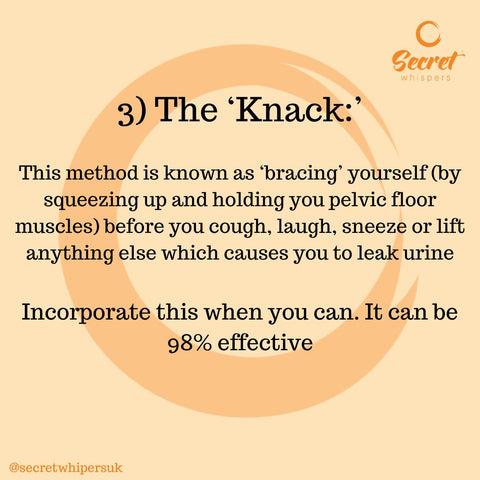Can Coughing Weaken The Pelvic Floor?
Updated Sept 2024
Yes, persistent coughing can weaken your pelvic floor. When you cough, you put pressure on your abdominal muscles and, in the same area, your pelvic floor muscles. This can cause urine leakage, especially at the time of coughing or sneezing.

Your pelvic floor weakens over time, especially if you have carried a child, irrespective of whether you gave birth vaginally or by C-section.
Having a job where you are regularly lifting heavy items and having issues with your menstrual cycle also add to the pelvic floor becoming weaker over time.
When you add in seasonal viruses and a chronic cough, pelvic pain can really creep up on you!
It can also be very embarrassing to leak urine if you cough or sneeze, and many women find that they take to wearing a pad or incontinence pants to prevent embarrassment.
If you're in this situation, we really recommend you check out reusable incontinence pants and pads whilst you're working on toning your pelvic floor muscles!

Trying not to cough or sneeze is also counter-productive, as this traps the pressure in the lower abdominal region, which over time, adds to the damage to your pelvic floor muscles.
You need to understand the affects that coughing, sneezing and lifting puts on your pelvic floor and with the information here in this blog we can help you improve your pelvic floor muscles and learn how to brace your pelvic floor beforehand.
Can Coughing Cause Pelvic Pain?
Yes, coughing can cause pelvic pain if you have a pelvic prolapse. You may find that your pelvis hurts when coughing or sneezing. This is because you are tensing up and putting pressure on your abdominal and pelvic floor muscles. If you have weak pelvic floor muscles or prolapse in that area, it will hurt even more.
Coughing and sneezing actually create more pressure than you may realise. All your muscles tense up to protect themselves, which can cause pain and pressure in the abdomen.
If you find that you are in a lot of pain, coughing and sneezing, you really should consult your primary care provider, as this could be a sign that the prolapse cannot be self-treated but needs medical intervention.
However, if it is a tolerable pain that you can live with, taking steps to strengthen your pelvic floor can help recover the issue so that you don't need to live in fear of pain on coughing or even when you laugh or sneeze.
How to Protect Your Pelvic Floor While Coughing
To protect your pelvic floor while coughing, you should take the following simple steps. When you feel a cough coming, you should try and pull your abdominal muscles into the centre as if a piece of string was pulling them back through your belly button. This helps to create internal stability.
Next, you need to try and contract the pelvic muscles in the same way as you would do for a Kegel exercise. This will help when it comes to protecting the organs of your pelvis, which include the bladder, uterus and rectum.
This is known as the Knack
There are 3 types of Kegels and this one 'The Knack' is really effective at stopping bladder leaks when coughing, sneezing, lifting and even laughing.

If at all possible, when you feel a coughing fit coming on, sit down rather than stand or lie down. So, if a coughing fit comes on in the night, you should sit up in bed until you can settle it. Try not to cough too hard, but at the same time, don't suppress it AND engage those pelvic floor muscles to protect it.
So, as soon as you feel a cough or sneeze coming on, simply pull up your pelvic floor muscles FAST. This really helps support your pelvic floor muscles.
I teach this in the 30 Day Pelvic Floor Challenge that I run a few times a year and also in the 6 week programme that comes with our pelvic floor toning weights.
You should also start a regular pelvic floor exercise routine. Kegel exercises are one of the most effective and are discrete and can be carried out anywhere. Waiting in line, sitting on the bus, you are simply contracting and releasing your pelvic floor muscles in order to build strength and help maintain longevity. You can test to see how strong your pelvic floor muscles are by trying to stop your urine mid-flow.
Don't do this regularly, or it can lead to infection and failure to fully empty the bladder, but it's perfectly safe to try it once to see how strong your pelvic floor muscles are. If you can stem the flow of urine, you have good strong muscles and should continue to exercise them to ensure they stay this way. If you struggle to stop the flow of urine and it is still passing through, there is plenty of work to be done.
There are also internal exercise devices that can help you perform Kegel exercises correctly, but if you don't feel that this is for you, learning to do them on your own is a better way. You are not looking to contract your bottom muscles but the pelvic floor muscles, and you are aiming to lift them and, hold them, then release them. You can repeat this several times and retest your mid-flow urine stream control after a few weeks.
Other tips for reducing urine leakage when suffering from a cough include losing weight and, once you have recovered from the cough, increasing your overall fitness and strength while avoiding very high-impact exercises. If you are struggling to recover from your cough, it may be worth seeing your primary care provider to see if there is anything they can do to help. Over-the-counter cough suppressants could also be helpful in this situation.
What About Ovary Pain When Coughing?
Ovary Pain when coughing could be as a result of ovarian cysts which are being squeezed when you cough or sneeze, so it's worthwhile getting this ruled out by your Dr.
The Bottom Line
A long-standing cough and coughing and sneezing generally can all cause issues with your pelvic floor, including pelvic pain from coughing. It is essential that you get to the underlying cause of the cough, and in the meantime, take precautions to stabilise your core before you have a coughing fit.
Learn how to do pelvic floor exercises and practice them regularly. Never try and suppress your cough, but try and cough gently and use the huffing technique to clear your chest rather than just coughing and productively.
Always sit rather than lie down or stand up when you are having a coughing fit, as this protects your pelvic floor a little bit more. If need be, you can apply pressure between your legs to help stabilise the area while you are working on it. Pelvic floor issues are incredibly common, and there are steps you can take to rectify the problem. Although some women find it embarrassing, there is no need to worry, as most of your peers will have experienced the same issues over the course of their life.
If you would like to learn more how our Pelvic Floor Exercise Weights can help you strengthen your pelvic floor in as little as 15 minutes a day.
➡️ You can also join our fabulous womens only private Facebook Group
➡️ Fancy a FREEBIE? Download our FREE guide The easy way to get a stronger pelvic floor
➡️ Sign Up Now - The 30 Day Pelvic Floor Challenge - Starts 13th March 2023. Limited spaces
Any questions? Just email us at support@secretwhispers.co.uk and we will get straight back to you.
Never miss another blog again and sign up here. You will get a 10% discount code to use too.
About the Author: Secret Whispers was founded by Julie Colan, a dedicated mum and health enthusiast who identified a gap in effective pelvic floor strengthening solutions. Driven by her own experiences, Julie set out to enhance pelvic floor awareness and education. Helen Rankin, who founded Cheeky Wipes and Cheeky Pants and developed a range of environmentally friendly 'Simple Reusables', has now taken over Secret Whispers. Helen brings a wealth of experience in sustainable product development, recognised by the prestigious Queens Award in Enterprise for Sustainable Development in 2021. Together, their shared mission continues to empower women with reliable health and wellness solutions.











